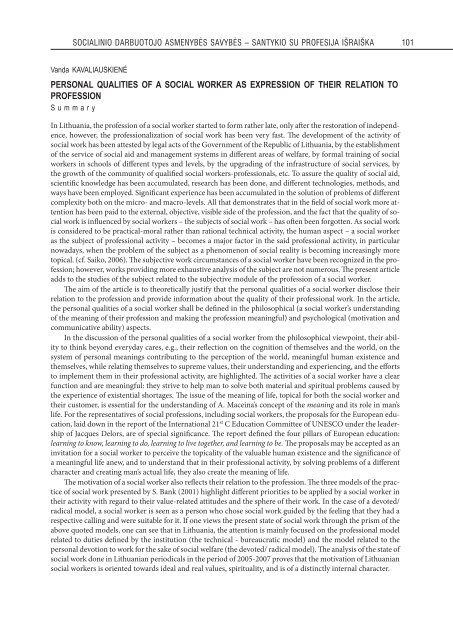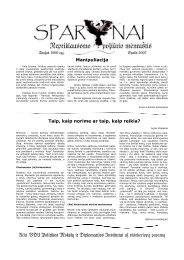Soter Nr. 26 - Vytauto Didžiojo universitetas
Soter Nr. 26 - Vytauto Didžiojo universitetas
Soter Nr. 26 - Vytauto Didžiojo universitetas
You also want an ePaper? Increase the reach of your titles
YUMPU automatically turns print PDFs into web optimized ePapers that Google loves.
SOCIALINIO DARBUOTOJO ASMENYBĖS SAVYBĖS – SANTYKIO SU PROFESIJA IŠRAIŠKA<br />
Vanda KAVALIAUSKIENĖ<br />
PERSONAL QUALITIES OF A SOCIAL WORKER AS EXPRESSION OF THEIR RELATION TO<br />
PROFESSION<br />
S u m m a r y<br />
In Lithuania, the profession of a social worker started to form rather late, only after the restoration of independence,<br />
however, the professionalization of social work has been very fast. The development of the activity of<br />
social work has been attested by legal acts of the Government of the Republic of Lithuania, by the establishment<br />
of the service of social aid and management systems in different areas of welfare, by formal training of social<br />
workers in schools of different types and levels, by the upgrading of the infrastructure of social services, by<br />
the growth of the community of qualified social workers-professionals, etc. To assure the quality of social aid,<br />
scientific knowledge has been accumulated, research has been done, and different technologies, methods, and<br />
ways have been employed. Significant experience has been accumulated in the solution of problems of different<br />
complexity both on the micro- and macro-levels. All that demonstrates that in the field of social work more attention<br />
has been paid to the external, objective, visible side of the profession, and the fact that the quality of social<br />
work is influenced by social workers – the subjects of social work – has often been forgotten. As social work<br />
is considered to be practical-moral rather than rational technical activity, the human aspect – a social worker<br />
as the subject of professional activity – becomes a major factor in the said professional activity, in particular<br />
nowadays, when the problem of the subject as a phenomenon of social reality is becoming increasingly more<br />
topical. (cf. Saiko, 2006). The subjective work circumstances of a social worker have been recognized in the profession;<br />
however, works providing more exhaustive analysis of the subject are not numerous. The present article<br />
adds to the studies of the subject related to the subjective module of the profession of a social worker.<br />
The aim of the article is to theoretically justify that the personal qualities of a social worker disclose their<br />
relation to the profession and provide information about the quality of their professional work. In the article,<br />
the personal qualities of a social worker shall be defined in the philosophical (a social worker’s understanding<br />
of the meaning of their profession and making the profession meaningful) and psychological (motivation and<br />
communicative ability) aspects.<br />
In the discussion of the personal qualities of a social worker from the philosophical viewpoint, their ability<br />
to think beyond everyday cares, e.g., their reflection on the cognition of themselves and the world, on the<br />
system of personal meanings contributing to the perception of the world, meaningful human existence and<br />
themselves, while relating themselves to supreme values, their understanding and experiencing, and the efforts<br />
to implement them in their professional activity, are highlighted. The activities of a social worker have a clear<br />
function and are meaningful: they strive to help man to solve both material and spiritual problems caused by<br />
the experience of existential shortages. The issue of the meaning of life, topical for both the social worker and<br />
their customer, is essential for the understanding of A. Maceina’s concept of the meaning and its role in man’s<br />
life. For the representatives of social professions, including social workers, the proposals for the European education,<br />
laid down in the report of the International 21 st C Education Committee of UNESCO under the leadership<br />
of Jacques Delors, are of special significance. The report defined the four pillars of European education:<br />
learning to know, learning to do, learning to live together, and learning to be. The proposals may be accepted as an<br />
invitation for a social worker to perceive the topicality of the valuable human existence and the significance of<br />
a meaningful life anew, and to understand that in their professional activity, by solving problems of a different<br />
character and creating man’s actual life, they also create the meaning of life.<br />
The motivation of a social worker also reflects their relation to the profession. The three models of the practice<br />
of social work presented by S. Bank (2001) highlight different priorities to be applied by a social worker in<br />
their activity with regard to their value-related attitudes and the sphere of their work. In the case of a devoted/<br />
radical model, a social worker is seen as a person who chose social work guided by the feeling that they had a<br />
respective calling and were suitable for it. If one views the present state of social work through the prism of the<br />
above quoted models, one can see that in Lithuania, the attention is mainly focused on the professional model<br />
related to duties defined by the institution (the technical - bureaucratic model) and the model related to the<br />
personal devotion to work for the sake of social welfare (the devoted/ radical model). The analysis of the state of<br />
social work done in Lithuanian periodicals in the period of 2005-2007 proves that the motivation of Lithuanian<br />
social workers is oriented towards ideal and real values, spirituality, and is of a distinctly internal character.<br />
101





